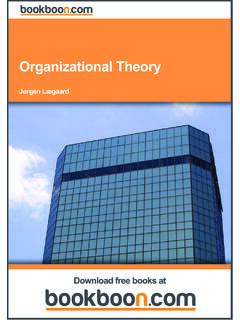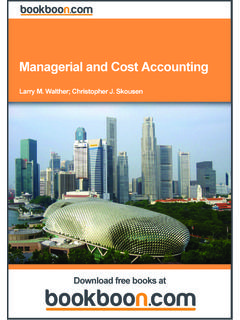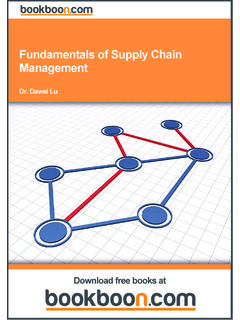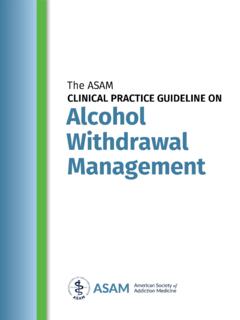Transcription of Fundamentals of Supply Chain Management - Kenyatta …
1 Dr. Dawei Lu Fundamentals of Supply Chain Management Download free books at Download free ebooks at Dr. Dawei LuFundamentals of Supply Chain ManagementDownload free ebooks at Fundamentals of Supply Chain Management 2011Dr. Dawei Lu & Ventus Publishing ApSISBN 978-87-7681-798-5 Download free ebooks at of Supply Chain Management4 ContentsContents Preface 71 Introduction Why Supply Chain Management Defining Supply chains Customer Orientation Defining Supply Chain Management Development Trends 162 Global Supply Chain Operations Global Business Environment Strategic Challenges How Global Supply Chains Responded Current Trends in Global SCM 273 Supply Chain Design and Planning Supply Chain Configuration Extent of Vertical Integration Outsourcing and Offshoring Location Decisions 39 Stand out from the crowdDesigned for graduates with less than one year of full-time postgraduate work experience.
2 London Business School s Masters in Management will expand your thinking and provide you with the foundations for a successful career in programme is developed in consultation with recruiters to provide you with the key skills that top employers demand. Through 11 months of full-time study, you will gain the business knowledge and capabilities to increase your career choices and stand out from the are now open for entry in September more information visit email or call +44 (0)20 7000 7573 Masters in ManagementLondon Business SchoolRegent s ParkLondon NW1 4 SAUnited KingdomTel +44 (0)20 7000 7573 Email your careerPlease click the advertDownload free ebooks at of Supply Chain Management5 Capacity Planning Bullwhip Effect 444 Lean Supply Management Origins of the Lean Manufacturing Lean Supply Principles Focusing on Cost-to-Serve Drivers for Lean Supply Chain Lean Process Mapping Tools 605 Agile Supply Management The Need for Agility Agile Supply Chain Concept Agile Supply Chain Framework Competing on responsiveness Getting It Right from Within.
3 806 Purchasing and Supplier Selection Strategic Role of Purchasing Purchasing Portfolio Supplier Selection Tools for Supplier Selection Towards Knowledge Based Sourcing 91 UBS 2010. All rights for a career where your ideas could really make a difference? UBS s Graduate Programme and internships are a chance for you to experience for yourself what it s like to be part of a global team that rewards your input and believes in succeeding you are in your academic career, make your future a part of ours by visiting You re full of energyand ideas. And that s just what we are looking click the advertDownload free ebooks at of Supply Chain Management6 Contents7 Relationship and Integration Supply Relationship Defined Close Partnership Strategic Alliance Relationship Dilemma Supply Chain Integration 1038 The Future Challenges Creating Customer Centric Supply Chain Managing Supply Networks Watch the Dynamics 1099 References 112 Please click the advertDownload free ebooks at of Supply Chain Management7 PrefacePrefaceI feel honoured to have this opportunity to write a book about the fundamental of Supply Chain Management for the Ltd and Ventus Publishing ApS.
4 The chosen topic represents my attempt to respond to the growing demand for better understanding of Supply Chain Management from managers, academics and graduate students alike. This book is based upon my 15 years of teaching experience gained through working in 6 different countries around world . Most of my courses on Supply Chain Management were targeted at the master and executive levels, from which I have learned and enjoyed as much as my students do. The most important lesson I learned is that Supply Chain Management is a dynamic and evolving subject. It is not a subject that just needs to be taught, but the one needs to be constantly developed. To certain extent, this book will hopefully contribute to such a to the constraints in the number of pages, this book will primarily focus on the fundamental principles of Supply Chain Management .
5 It will cover all the key conceptual areas with short business cases, but is limited in scope on Management skill coaching. The book is particularly suitable for those readers who may have come across the subject anecdotally but have never studied it order to continuously improve my book, I would appreciate any suggestions and comments. Please do not hesitate to get in touch with me through: Dawei LuApril, 2011 Download free ebooks at of Supply Chain Management8 Introduction1 Why Supply Chain Management A Supply Chain is basically a group of independent organisations connected together through the products and services that they separately and/or jointly add value on in order to deliver them to the end consumer. It is very much an extended concept of an organisation which adds value to its products or services and delivers them to its customers.
6 But what is the benefit of understanding the value adding from the Supply Chain perspective? Why managing Supply Chain is becoming necessary and important to today s business success? These are some of the fundamental questions that must be first addressed before discussing the how to questions. Over the last three decades, the concept and theory of business Management have undergone profound changes and development. Many old ways of doing business have been challenged and many new ideas and approaches have been created, among them are business process re-engineering, strategic Management , lean thinking, agile manufacturing, balanced scorecard, blue ocean strategy.
7 Just to name a few. Supply Chain Management is undoubtedly one of those new and well grown Management approaches emerged and rapidly developed across all industries around the world . The earliest appearance of the term Supply Chain Management as we know it today published in recognisable media and literatures can be traced back to the early 1980s. More precisely, it first appeared in a Financial Times article written by Oliver and Webber in 1982 describing the range of activities performed by the organization in procuring and managing supplies. However the early publications of Supply Chain Management in the 1980s were mainly focused on purchasing activities and cost reduction related activities. The major development and the significant increases of publications in the areas of Supply Chain integration and supplier-buyer relationship came in 1990s when the concept as we know it today was gradually is therefore clear that Supply Chain Management is not one of the legacy academic subjects existed for hundreds or thousands of years, but rather a young and even nascent subject.
8 It is only recently that business world started making use of this concept. So, the question is Why now? A convincing answer to this question is that our business environment has changed, which includes globalisation, more severe competition, heightened customer expectation, technological impact and geopolitical factors and so on. Under such a renewed business environment, an organisation focused Management approach is no longer adequate to deliver the required competitiveness. Managers must therefore understand that their businesses are only part of the Supply chains that they participated and it is the Supply Chain that wins or loses the , the arena of competition is moving from organisation against organisation to Supply Chain against Supply Chain .
9 The survival of any business today is no longer solely dependent on its own ability to compete but rather on the ability to cooperate within the Supply Chain . The seemingly independent relation between the organisations within the Supply Chain becomes ever more interdependent. You sink or swim with the Supply Chain . It is for this reason that gives rise to the need for Supply Chain free ebooks at of Supply Chain Management9 IntroductionConsequently, aspiring to become an excellent business simply through an entirely inward looking Management approach can be very illusive. What s more practical and indeed more assured way of better managing a business is to managing it along with the Supply Chain through appropriate strategic positioning, adequate structural configuration, collaboration, integration and leadership.
10 The paramount importance of doing so does not derive from the theories or reasoning, rather it is withstood by the business performance improvement and market measured customer results. It is the tangible benefits and success that it delivers makes the subject Chain Management is also pervasive and ubiquitous. One can hardly find any aspect of business that has nothing to do with Supply Chain Management . Take an example of quality Management a very important part of today s business Management , and ask yourself a question: can you manage and improve the quality standard of your product or service measured by the end-consumer without managing the suppliers and buyers in the Supply Chain at all? Of course not.











